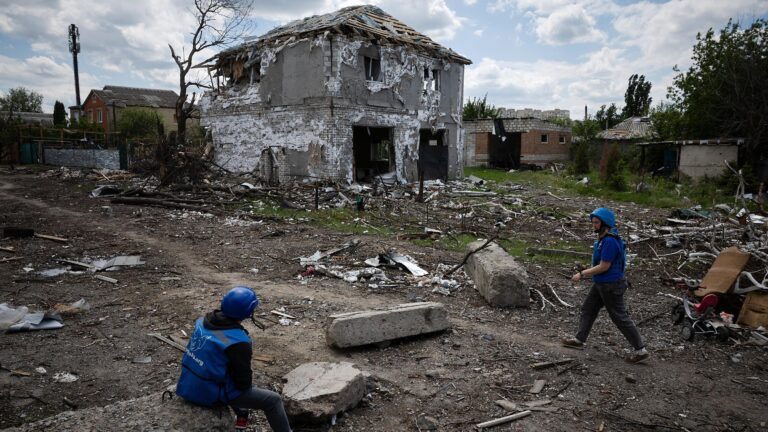Escalation of Tensions: Russia’s Missile Strikes on Kyiv Following Prisoner Exchange
In a significant escalation, Russia has initiated a series of missile attacks on Kyiv shortly after an important prisoner exchange involving detainees from both Ukraine and Russia. This surge in military aggression occurs as both countries grapple wiht the complexities of warfare, diplomatic negotiations, and pressing humanitarian issues. The circumstances surrounding the exchange are under intense scrutiny as analysts assess how these military actions might affect the already fragile peace talks. The strikes reportedly aimed at critical infrastructure within the capital have reignited concerns about an intensification of hostilities, highlighting the delicate balance of power in Eastern europe.As developments unfold, global observers remain hopeful for a resolution to this ongoing crisis.
Russia’s Military Strategy in Ukraine After the Prisoner Exchange
The recent prisoner swap between Russia and Ukraine represents a pivotal moment with ramifications that extend beyond immediate familial relief for those affected by conflict.In the aftermath of this exchange, reports emerged regarding missile strikes targeting Kyiv, suggesting a potential shift in Russia’s military strategy during this protracted war. Analysts propose that these actions may serve dual purposes: retribution and deterrence,aimed at reaffirming Moscow’s military strength while simultaneously influencing its negotiating stance in peace discussions. Furthermore, this escalation illustrates Russia’s readiness to combine military force with diplomatic efforts—a complex balancing act amid international relations and domestic pressures.
Several factors contribute to shaping Russia’s current military posture in Ukraine along with its overarching strategic goals:
- Enhanced Military Deployment: There is potential for increased troop presence and resources near vital areas as Moscow seeks to reclaim lost territories.
- Advanced Weaponry Utilization: A shift towards deploying more complex missile systems could improve strike capabilities against Ukrainian targets.
- Psycho-Strategic Operations: regular attacks on urban centers like Kyiv function as psychological tactics designed to instill fear among civilians.
This trajectory suggests forthcoming tactical adjustments and realignments within the geopolitical landscape unfolding across Eastern Europe. While crucial for humanitarian reasons, the prisoner exchange appears embedded within a broader context characterized by heightened military readiness and operational assertiveness that may escalate further in upcoming weeks.
Impact of Kyiv Strikes on Global Relations and security Frameworks
The recent missile strikes on Kyiv—coinciding with an essential prisoner swap—underscore intricate dynamics influencing international relations today. Such aggressive maneuvers by Russia not only heighten regional tensions but also indicate possible shifts within broader geopolitical frameworks. Countries closely observing these developments—including NATO allies—are prompted to reassess their strategic alliances and defense strategies due to perceived escalated threats from Russian actions.
The implications extend further into Eastern Europe’s security architecture; these strikes could necessitate adjustments in international diplomatic initiatives aimed at resolving conflicts peacefully. Observers may witness diminishing trust between conflicting parties leading potentially toward breakdowns in dialog channels or calls for renewed sanctions alongside increased support for Ukraine’s defense efforts. The response from global powers will be pivotal in determining future interactions while establishing deterrent measures against similar aggressions moving forward.
Humanitarian Concerns Amidst Escalating Conflict Dynamics
The intensifying conflict exemplified by airstrikes on Kyiv amidst significant prisoner exchanges raises urgent humanitarian considerations that cannot be overlooked. As hostilities escalate, civilian impacts become increasingly severe; humanitarian organizations are raising alarms over rising displacement rates alongside injuries sustained during violence incidents coupled with human rights violations documented throughout affected regions.
As global attention remains focused hear it is imperative we prioritize civilian protection through key considerations such as:
- Aid Accessibility: Ensuring humanitarian organizations can reach impacted populations is crucial for delivering essential services including medical care & food supplies effectively.
- Civilian Protection Measures: Efforts must increase significantly towards safeguarding civilian infrastructures like hospitals & schools from attack risks associated with ongoing warfare activities.
- lawsuit Accountability Mechanisms: Monitoring & documenting violations creates pathways toward accountability which can deter future abuses occurring amidst conflict zones globally!
The urgency surrounding addressing these pressing humanitarian challenges grows exponentially alongside continued fighting conditions present today! Coordinated international responses remain essential if we hope alleviate suffering experienced daily while ensuring core principles guiding humanity stay prioritized even amid militaristic strategies employed across various fronts worldwide! Without immediate action taken soon enough civilians caught up crossfire face escalating dangers along enduring hardships ahead!
| Description | Total Count |
|---|---|
| IDPs (Internally Displaced Persons) | 8 million+ |
| Civilians impacted By Violence | 15+ Million |
| Children Requiring Humanitarian Aid | 6+Million |




